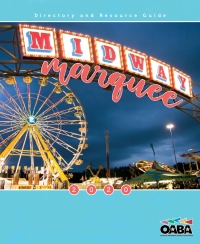mobile amusement industry.
FLORIDA
HB 1267 and similar SB 1788
Both bills include changes by the Department of Agriculture, to the Florida Amusement Rides Statute 616.242. Please go to our website, www.oaba.org to review changes to this statute. OABA’s Safety Committee is reviewing this, as well.
UTAH
HB 381 Rep. Val Potter
3/1/2019 Passed 10-1 by House Committee on Transportation
Creates the Utah Amusement Ride Safety Committee within the Department of Transportation. Provides for certification of qualified safety inspectors to perform in-person inspections of amusement rides; requires an owner-operator of an amusement ride to ensure an annual in-person inspection of the amusement ride as well as daily inspection of the amusement ride; establishes minimum liability insurance requirements; enacts reporting requirements when a fatality or certain types of injuries occur when there is a failure or malfunction of an amusement ride.
TEXAS
HB 2289 Rep. Lina Ortega |
2/25/2019 Filed
Provides for oversight and regulation of amusement rides from the Department of Insurance to the Texas Department of Licensing and Regulation.
NEBRASKA
NDOL 2/8/2019
Public Hearing
Proposes modifications to amend the operation and oversight of amusement rides in the State, to provide for inspections to be performed by third-party inspectors, for purposes of the annual safety inspection.
MARYLAND
HB 8 Rep. Mark Chang
Creates the Maryland Rider Safety Act: For the purpose of requiring riders of amusement attractions to obey certain rules and to refrain from certain actions relating to riding an amusement attraction; requiring riders of amusement attractions or the parent or guardian of certain riders to make certain determinations before riding or attempting to ride an amusement attraction; requiring the parent or guardian of a certain rider to ensure that the rider complies with certain provisions of law; requiring an injured rider or the parent or guardian of a certain rider to submit a written report to the amusement owner under certain circumstances; requiring a certain written injury report to include certain information; providing for the construction of certain provisions of this Act; requiring amusement owners to display a certain sign containing certain language in certain locations; defining certain terms; making the provisions of this Act severable; and generally relating to the Maryland Rider Safety Act.
LOUISIANA
Emergency Regulations03/22/18 - Emergency Rules Amusement Attraction and Ride Safety
Regarding the regulation of inflatable amusement devices, amusement attraction, and amusement rides. Requires adoption of a rule in response to the newly enacted Act No. 462, Regulation of Amusement Attractions and Rides, 2016 Regular Session, that provides the guidelines for maintaining the inflatable amusement devices, amusement attractions, and amusement rides for operational and safety purposes. Provides the procedures for reporting death and injury. Provides the inspection process to ensure the devices, attractions, and rides are operating safely and properly.
VERMONT
H. 780
Requires a ride that is moved from location to location to be inspected after the ride has been set up in the State or in the preceding 12 months. Requires a portable amusement ride be inspected by a person certified by the National Association of Amusement Ride Safety Officials, as a Level II, NAARSO inspector. Requires the Secretary of State to insure $1 million of liability insurance to owner and patrons, plus includes operator and patron rider responsibility/safety requirements.
Signed by Governor on May 28, 2018;Effective in 2019
NEW JERSEY
$15 / HOUR MINIMUM WAGE LEGISLATION
NJ Governor Phil Murphy, Senate President Steve Sweeney, and Assembly Speaker Craig Coughlin announced an agreement on legislation to raise New Jersey's minimum wage to $15 / hour wages for over one million workers and promoting broad-based economic growth.
Under the legislation, the base minimum wage for New Jersey workers would increase to $10 / hour on July 1, 2019. By January 1, 2020, the statewide minimum wage would increase to $11 / hour, and then would increase by $1 / hour every January 1st until it reaches $15 / hour on January 1, 2024, impacting over one million New Jersey workers.
For seasonal workers and employees at small businesses of five workers or less, the base minimum wage would reach $15 / hour by January 1, 2026. By January 1, 2028, workers in these groups will receive the minimum wage inclusive of inflation adjustments that take place from 2024 to 2028, equalizing the minimum wage with the main cohort of New Jersey workers.






